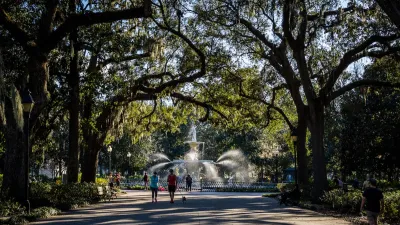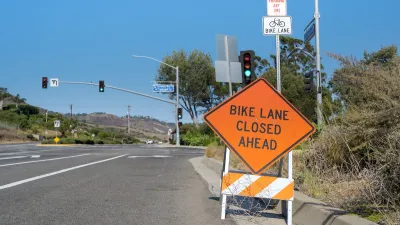The Living Cully coalition prioritizes the well-being of long term, lower-income residents with future-building revitalization projects.

Northeast Portland, Oregon’s largest and ethnically diverse Cully neighborhood is the setting for a case study in community-led efforts to fortify the ability lower-income residents to withstand gentrification and displacement. “Many green infrastructure project teams flounder when trying to couple social justice with their environmental goals, but in Cully green infrastructure provision is linked explicitly with wealth building and anti-displacement goals through a coalition called Living Cully,” reports Barbra Brown Wilson, adapting a chapter from her book Resilience for All.
Living Cully, a collective project of Verde, Native American Youth and Family Center, Habitat for Humanity Portland/Metro East, and Hacienda Community Development Center, was formed to address the lack of infrastructure and services available to Cully residents. Central to their mission is investment “in local residents through leadership development and job training that allow lower-income residents to contribute to positive change in their communities, while also building their own capacity to stay as revitalization occurs,” Brown outlines.
Since the coalition’s formation in 2012, partnering organizations have successfully launched initiatives to champion policies to protect renters, supply affordable housing, develop Cully’s transportation infrastructure, provide job training, and improve community safety. The immediate impact of these efforts is felt widely, but it remains to be seen what long-term effects will remain in terms of “adaptive capacity of resident leaders engaging in these organizing and job-training efforts, the culture change beginning when a generation of youth see walking and biking as important to their community, and the impact of young leaders actualizing many new professional techniques to better their community as part of their middle school skills set.”
FULL STORY: When Green Infrastructure Is an Anti-Poverty Strategy

Alabama: Trump Terminates Settlements for Black Communities Harmed By Raw Sewage
Trump deemed the landmark civil rights agreement “illegal DEI and environmental justice policy.”

Study: Maui’s Plan to Convert Vacation Rentals to Long-Term Housing Could Cause Nearly $1 Billion Economic Loss
The plan would reduce visitor accommodation by 25% resulting in 1,900 jobs lost.

Planetizen Federal Action Tracker
A weekly monitor of how Trump’s orders and actions are impacting planners and planning in America.

Waymo Gets Permission to Map SF’s Market Street
If allowed to operate on the traffic-restricted street, Waymo’s autonomous taxis would have a leg up over ride-hailing competitors — and counter the city’s efforts to grow bike and pedestrian on the thoroughfare.

Parklet Symposium Highlights the Success of Shared Spaces
Parklets got a boost during the Covid-19 pandemic, when the concept was translated to outdoor dining programs that offered restaurants a lifeline during the shutdown.

Federal Homelessness Agency Places Entire Staff on Leave
The U.S. Interagency Council on Homelessness is the only federal agency dedicated to preventing and ending homelessness.
Urban Design for Planners 1: Software Tools
This six-course series explores essential urban design concepts using open source software and equips planners with the tools they need to participate fully in the urban design process.
Planning for Universal Design
Learn the tools for implementing Universal Design in planning regulations.
Caltrans
Smith Gee Studio
Institute for Housing and Urban Development Studies (IHS)
City of Grandview
Harvard GSD Executive Education
Toledo-Lucas County Plan Commissions
Salt Lake City
NYU Wagner Graduate School of Public Service





























